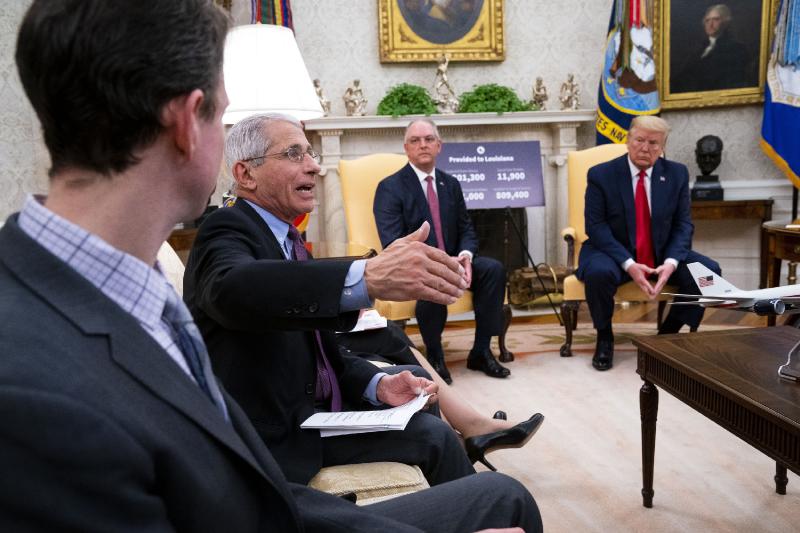The Coronavirus Drug Remdesivir Is a Big Deal. But How Much Will It Cost? | Opinion
By: Abdul El-Sayed and Victor Roy (Newsweek)


Disease means dollars; lots and lots of dollars. The owners of science offer a devil's bargain; your money or your life. It would be cheaper to buy a gold-plated coffin than buying medical care.

Remdesivir, a drug developed to treat Ebola during the epidemic in West Africa, may have found its true purpose in treating COVID-19. Just before Remdesivir was given an emergency use authorization by the FDA last week, Dr. Anthony Fauci, director of the National Institute of Allergy and Infectious Diseases and the most trusted voice on the White House coronavirus task force, said, "The data shows that remdesivir has a clear-cut, significant, positive effect in diminishing the time to recovery."
That's a big deal in the battle against the global COVID-19 pandemic. Or at least it should be.
Remdesivir is owned by Gilead Sciences, whose stock price went soaring on the news. But this isn't the first time Gilead has had an effective treatment for a deadly infectious disease. And what happened before raises some serious questions about whether or not such a treatment will be affordable and accessible for the people hit hardest by COVID-19.
In 2014, Gilead Sciences made headlines for its cure for hepatitis C, one of the deadliest infectious diseases in the world. Its treatment, sofosbuvir, marketed as Sovaldi, was something of a miracle drug, curing hepatitis C in most patients. However, that's not why Gilead made headlines. Rather, it was because they priced Sovaldi—a drug that costs less than $150 per course to manufacture—at $84,000 a course.
Findings from an 18-month Senate Finance Committee investigation found that Gilead's pricing strategy for the drug focused on revenues rather than relief. It considered setting the price anywhere from $50,000 to $115,000 a course—opting to avoid "high levels of advocacy group criticism and negative PR/competitive messaging" at the upper bound. Yet it worried that setting the floor too low would leave "significant foregone revenue" behind.
Benchmarking was critical to Gilead. Setting such a high floor would establish a new price norm that would increase revenue from all future hepatitis C treatments, too. The Senate report concludes, "By elevating the price for the new standard of care set by Sovaldi, Gilead intended to raise the price floor for all future hepatitis C treatments, including its follow-on drugs and those of its competitors."
But that price meant that patients were "warehoused," a pharmaceutical industry term sterilized to mask its troubling moral implications. It means deferring patients eligible for treatments because of costs—literally leaving them untreated with a deadly disease. Why? The Oregon Health Authority estimated that treating even half of the 10,000 eligible hepatitis C patients in the state would have doubled its Medicaid prescription drug budget. Instead, the state opted to treat only 500—of an eligible 10,000—people a year for the next six years.
The consequences have been disastrous. The existence of a curative treatment for hepatitis C should mean that it can be eradicated. Instead, even as Sovaldi hit the market, hepatitis C incidence boomed—largely driven by increases in injection drug use during the opioid crisis and the prohibitive cost of cure.
Sovaldi isn't an isolated incident. Just last year, Gilead CEO Daniel O'Day was hauled up to Capitol Hill to defend his company's pricing of Truvada, an anti-retroviral medication used to prevent HIV. Gilead manufactures Truvada for $6 a course—but prices it at $1,780 a month. That's more than double its debut list price in 2004.
To add insult to injury, drugs like remdesivir often have their start as taxpayer-funded research projects. The U.S. Army, Centers for Disease Control and Prevention, and the National Institutes of Health directly invested over $70 million in the early-stage research behind remdesivir and also financed several of the clinical trials on its safety and efficacy.
Though Gilead has donated its entire existing stockpile of remdesivir to the U.S. government, how it plans to price remdesivir in the future remains an open question. Indeed, in March, Gilead applied for and was granted an "Orphan Drug" designation from the Food and Drug Administration, a program intended to spur research and development for medications for rare diseases through a seven-year exclusivity window. That would have given Gilead a monopoly on remdesivir for the better part of the next decade. The backlash was severe. Bowing to the pressure, Gilead rescinded its application. In an open letter, O'Day vowed, "We will work to ensure affordability and access so that remdesivir is available to patients with the greatest need."
That may be true for now. But epidemiologists and infectious disease experts are predicting that the novel coronavirus could become endemic, meaning it could take on a seasonal pattern of transmission, staying with us, like the flu, for a long time to come. If so, an effective treatment for COVID-19 could become particularly profitable over the long term. Like it did for Sovaldi, Gilead may follow its incentive to set a high benchmark price for future treatments for COVID-19 as well—raising the price as high as possible now in the process.
All of this suggests that it's not enough to simply invest in research and development for new medications for COVID-19. Policymakers must be paying attention to how those treatments will be made available to everyone.
Dr. Anthony Fauci, director of the National Institute of Allergy and Infectious Diseases, discusses early results of testing the drug remdesivir during a meeting in the Oval Office of the White House on April 29 in Washington, D.C.Doug Mills/The New York Times/Pool/Getty
It should be morally obvious why point-of-care costs for COVID-19 treatments should be made free of charge in the midst of a global pandemic. Cost shouldn't prohibit treatment. Less obvious, though, is that the costs of these treatments could bankrupt public (and private) insurance systems in the process. So even as we invest in research and development, we must also put in place clear limitations on corporate pricing of these medications, so they do not inadvertently displace other budget priorities in the process.
To do this, the U.S. government should set conditions on public financing for COVID-19 that guarantee access upon approval. Public health systems can also consider negotiating up-front, lump-sum payments. When it came to Gilead's hepatitis C medications, Australia and U.S. states like Louisiana and Washington tested such payment models, which reduced prices and increased access. And if Gilead or other companies resist these negotiations, the federal government should use legal tools, such as the 1498 clause in the Constitution, to grant licensing to generic manufacturers who can produce medicines at a far lower price.
Gilead, worth over $100 billion, will be just fine. Low-income people suffering COVID-19 may not be.
Abdul El-Sayed, M.D., D.Phil., is an epidemiologist and former health director for the City of Detroit. He is the author of Healing Politics: A Doctor's Journey into the Heart of our Political Epidemic and host of the podcast America Dissected.
Victor Roy, M.D., Ph.D., physician at Boston Medical Center and researcher with University College London's Institute for Innovation and Public Purpose.
The views expressed in this article are the writers' own.
Tags
Who is online
46 visitors


Science is not a servant of the public. Science serves the interests of profiteers. Those who own science receive the greatest rewards.